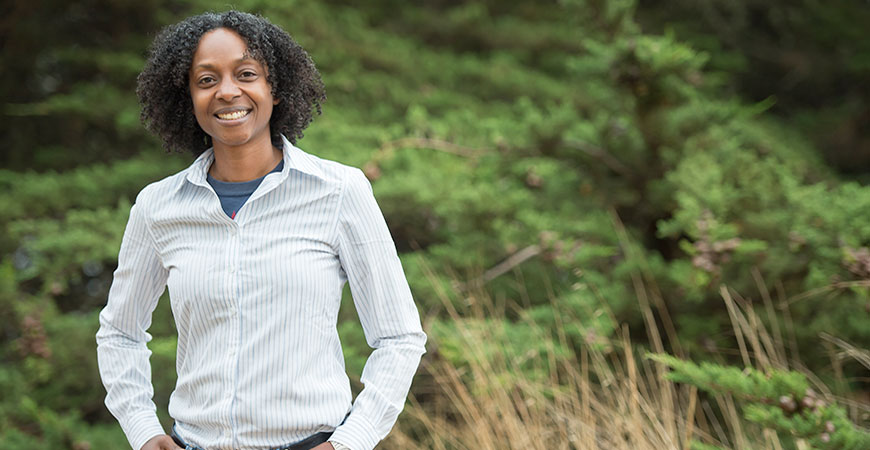
The world is a complex place, and humanity faces major challenges. Climate change mitigation might be the most difficult, in large part because of the interdependency of living things and their ecosystems.
How do people transform economic systems so they are also sustainable for people and the planet?
“If we don’t consider how everything connects from a systems perspective, we’re not going to solve grand challenges such as climate change,” Professor Tracey Osborne said. “Not even close.”
Osborne, who joined the Department of Management of Complex Systems in the Ernest and Julio Gallo Management Program in January, brings that kind of broad perspective to her emerging areas of research.
“Tracey Osborne’s work is innovative and interdisciplinary,” department Chair Professor Paul Maglio said. “She views forest and environmental systems as coupled with political systems and has developed a rigorous and important research program with a strong international reputation.”
Her work focuses on social and political economic aspects of climate-change mitigation in tropical forests and the role of Indigenous people in these efforts; the politics of climate finance, especially carbon markets; global environmental governance; and climate equity and justice.
She’s interested in natural climate solutions, particularly tropical forests, and spends part of her research time in Mexico and in the Amazon — Ecuador, Peru and Guyana — working on sustainable land-use and forest practices with Indigenous communities that serve as important climate change mitigation strategies.
“Tropical forests are just one example of nature-based solutions,” Osborne explained. The areas with the most biodiversity and the most pristine settings are managed by Indigenous people. But the rainforest — called Earth’s Lungs — is disappearing, cleared for agriculture or other development or consumed by wildfire.
“Our students recognize the need for understanding complex systems and know that we won’t find the answers through siloed thinking. Due to its social and ecological complexity, climate change is particularly daunting. It’s the challenge of our lifetimes.”
Whether in California, Mexico or in South America, Osborne is busy.
She recently gave a presentation at the Clean Energy for Biden meeting; she’s a member of the Applied Research Working Group of the UC Global Climate Leadership Council; and she has been moderating a series of expert panels organized by her colleague, Professor Anna Zalik at York University in Canada, exploring COVID and aspects of social justice, including labor and public health.
She also leads the Climate Alliance Mapping Project, a collaborative effort between academics, environmental non-governmental organizations and Indigenous organizations seeking socially just responses to climate change through research, maps and digital stories. The interactive digital map charts ecologically and culturally sensitive areas where people living alongside fossil fuel development are directly challenging extraction and provides a platform for people to share their stories as advocates of keeping fossil fuels in the ground. In collaboration with an Indigenous environmental organization, her team is mapping the Keystone XL pipeline, to find areas where the line could contaminate water and land, but also to identify areas of gender violence associated with pipeline work camps along the route.
This fall, she’s teaching a graduate seminar on systems thinking, the interdisciplinary study of considering relationships, patterns and context to solve complex social and environmental problems. Her class will primarily focus on climate change and sustainability.
“Our students recognize the need for understanding complex systems and know that we won’t find the answers through siloed thinking,” Osborne said. “Due to its social and ecological complexity, climate change is particularly daunting. It’s the challenge of our lifetimes.”
Osborne was named the UC Presidential Chair in Management of Complex Systems in recognition of her pioneering work in climate change mitigation and its relation to social justice.
This five-year appointment gives her the chance to build a new program. She’s taking over leadership of UC Merced’s Center for Climate Communications and refocusing it as the Center for Climate Justice. She intends to build a network across all the UC campuses where scholars can collaborate on projects revolving around four pillars:
- Just transitions to sustainable, clean economies;
- Indigenous climate action, including governance, land-use and cultural aspects;
- Natural climate solutions including sustainable forest and agricultural landscapes; and
- Climate communication, education and engagement
She’s surveying faculty across the UC system now to gauge interest and gain feedback in anticipation of an early fall launch.
“It provides a container for my own work and the research carried out by UC faculty, researchers and students committed to climate justice,” she said.
An alumna of UC Berkeley, Osborne spent 10 years with the geography faculty at the University of Arizona before returning to California.
“California is a leader in climate change research, policy and action, and I want to participate in this important work” she said. “I’m thrilled to join UC Merced because of the innovation, diversity and interdisciplinarity, but also because of the deep commitment to engagement here. There are many exciting opportunities.”
Lorena Anderson

Senior Writer and Public Information Representative
Office: (209) 228-4406
Mobile: (209) 201-6255






